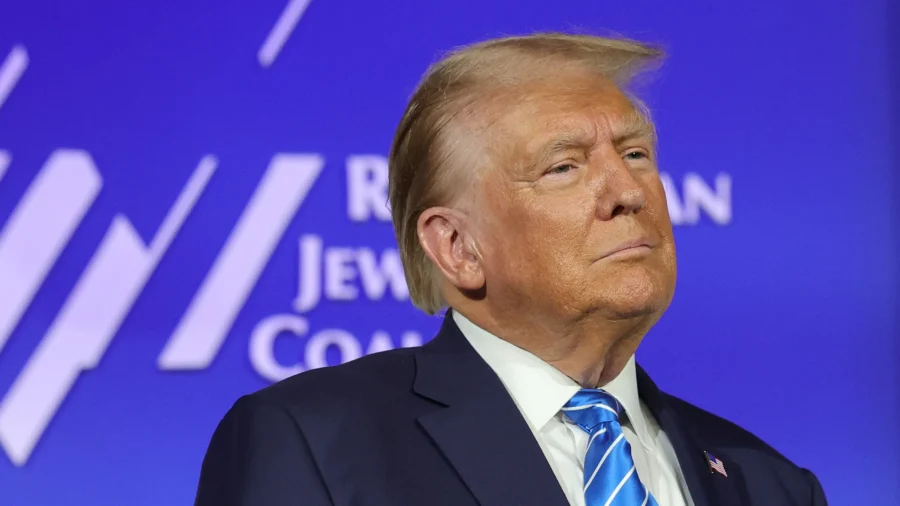Minnesota Supreme Court justices heard arguments on a petition meant to keep former President Donald Trump off the state’s primary ballot as he seeks to run for the presidency again in 2024. Far and away the frontrunner candidate in the Republican Party, the question they faced was not so hypothetical, as state election officials do expect the state’s Republican Party to submit his name in January 2024.
Free Speech for People, the group that began sending letters to state election officials in 2021 after President Trump left office arguing he is ineligible to seek office again, brought the Minnesota petition against Steve Simon, Minnesota’s secretary of state. They are representing eight local voters.
The Thursday hearing in Minnesota was different in nature from the ongoing trial in Colorado over the same issue, as it was not an evidentiary hearing. While the Colorado trial that began Monday is focused on proving out whether the events of Jan. 6, 2021, constituted an insurrection, as opponents of President Trump have alleged, and whether he engaged in an insurrection, the Minnesota Supreme Court justices questioned attorneys over whether the court had jurisdiction over the matter and whether they should take the case even if they do. Petitioners have asked for an evidentiary hearing to be scheduled.
14th Amendment Lawsuits
The 14th Amendment was ratified after the Civil War, with the purpose of granting citizenship and equal rights to former slaves. It also includes a third section that barred those who had engaged in insurrections or rebellions from holding office.
Free Speech for People has argued since 2021 that President Trump led the events of Jan. 6, 2021, constituting an insurrection, and is therefore ineligible to appear on future ballots for public office. Lawsuits of this nature have been brought by various groups in several states this year, including some that have already been dismissed with judges claiming they lack jurisdiction.
Ronald Fein, attorney for Free Speech for People; Assistant Attorney General Nathan Hartshorn, representing Mr. Simon; Nicholas Nelson, representing President Trump and his campaign; and Reid LeBeau, representing the Republican Party of Minnesota, presented arguments. President Trump and the Republican Party are intervenors, not defendants, in the case.
Minnesota Supreme Court Chief Justice Natalie Hudson asked attorneys to explain whether they believed Section 3 of the 14th Amendment was self-executing—meaning states would determine eligibility and act accordingly, rather than have Congress make such determinations and notify the states—and whether the court should act on this if true.
“Let’s say we agree with you that Section 3 is self-executing … the question that concerns me the most [is] 50 different states deciding this question differently,” she said. “That concerns me, that you have this possibility of, as Justice Chase said, just chaos.”
Several times the attorneys and judges referred to an opinion written by U.S. Supreme Court Justice Salmon Chase, who, after the Civil War, interpreted the 14th Amendment for the first time.
Justice Hudson said that Justice Chase had said, read plainly, the section is indeed self-executing. But he seemed to backtrack as he continued, opining that if they were to interpret the text this way, numerous officials would need to be stripped from their positions, and opted to cause little disruption, she summarized. She questioned attorneys as to whether they agreed with his opinion and if it should stand in this case.
She said there was “mixed authority” regarding this issue, and “doesn’t that suggest we use caution and some judicial restraint and maintain the status quo, if you will?”
Mr. Fein argued that if Minnesota ruled in this case, it would not create chaos and 50 different ballots, because President Trump is expected to appeal and take the issue to the Supreme Court.
Secretary of State Powers
In light of these lawsuits, many secretaries of state have publicly commented on the fact that they administer elections, but do not have the authority to determine eligibility.
Mr. Simon, a Democrat, has also insisted that the secretary of state’s office does not have the authority to determine eligibility, and will adhere to whatever the court decides. His attorney reiterated this stance in court, stating that they have no arguments regarding the merit of the case, but disagreed with the petitioners that it is an “error” for the secretary to put President Trump on the ballot, because if he does so he will be following state election rules.
Justice Hudson said that the petitioners’ position that the secretary had the authority to determine who to put on the ballot gave the office a great deal of power.
Mr. Fein conceded in court that the petitioners were willing to put aside question of whether the state secretary had that power, because the court had the authority to rule on President Trump’s eligibility even if Mr. Simon doesn’t.
Mr. Nelson, representing President Trump and his campaign, argued that states do not have the jurisdiction to make “binding legal rulings of who is eligible or not.”
“That’s not something that the Constitution says the state should do,” he said, explaining that the Constitution explains in length the process for selecting a president, and that “major questions of who should be president” is a political one for the people, not a judicial one for the courts to determine.
From The Epoch Times

